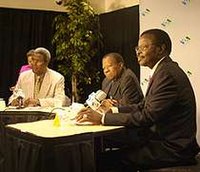Mahamane Ousmane
| Mahamane Ousmane | |
|---|---|

Mahamane Ousmane (right) on a 2005 panel with former Presidents Ketumile Masire of Botswana (centre) and Antonio Manuel Mascarenhas Monteiro of Cape Verde (left).
|
|
| President of Niger | |
|
In office April 16, 1993 – January 27, 1996 |
|
| Prime Minister |
Mahamadou Issoufou Souley Abdoulaye Hama Amadou |
| Preceded by | Ali Saibou |
| Succeeded by | Ibrahim Baré Maïnassara |
| Majority | 54.42% (2nd round 1993) |
| President of the National Assembly of Niger | |
|
In office December 1999 – May 2009 |
|
| Speaker of ECOWAS Parliament | |
|
Assumed office 2006 |
|
| Personal details | |
| Born |
January 20, 1950 Zinder, Niger, French West Africa |
| Nationality | Nigerien |
| Political party | Democratic and Social Convention-Rahama |
| Spouse(s) | Nana Mariama Ibrahim Adjia |
Mahamane Ousmane (born January 20, 1950) is a Nigerien politician. He was the first democratically elected and fourth President of Niger, serving from 16 April 1993 until his ousting in a military coup d'état on 27 January 1996. He has continued to run for president in each election since his ousting, and he was president of the National Assembly from December 1999 to May 2009. He is the president of the Democratic and Social Convention-Rahama (CDS), a major political party that is currently in opposition.
Ousmane, the candidate of the CDS, ran for president in the election held on February 27, 1993. He received second place, with 26.59% of the vote, behind Tandja Mamadou of the National Movement for the Development of Society (MNSD); however, with the backing of a coalition of parties known as the Alliance of the Forces of Change (AFC), Ousmane won the presidency in the second round, held on March 27, taking 54.42%.
During the first part of Ousmane's term, the AFC, which included Ousmane's party, held a parliamentary majority. In September 1994, however, Ousmane issued a decree that reduced the powers of the prime minister; the resignation of prime minister Mahamadou Issoufou soon followed, along with the withdrawal of his party, the Nigerien Party for Democracy and Socialism (PNDS), from the governing coalition. This left the coalition without a parliamentary majority; despite this, Ousmane appointed his CDS ally Souley Abdoulaye as prime minister, but the parliament quickly passed a vote of no confidence against Abdoulaye. Consequently, new parliamentary elections were called for January 1995. These elections resulted in a victory for the opposition, composed of a new alliance between the MNSD and the PNDS, and forced cohabitation between Ousmane and a government headed by MNSD Prime Minister Hama Amadou. This resulted in sharp rivalry and government deadlock; beginning in April, Ousmane refused to attend meetings of the Council of Ministers although he was constitutionally required to do so, and in July Amadou replaced the heads of state-owned companies, a move which Ousmane wanted to be reversed. Amadou also tried to assume the presidential role with regard to the Council of Ministers. Tensions continued to escalate, and Ousmane made clear his intention to dissolve the parliament and call new elections after the passing of one year (he was constitutionally prohibited from doing so sooner).
...
Wikipedia
